Best recovery drinks for cycling 2025: post-ride drinks rated and reviewed
We look at the best available protein and recovery drinks to ensure you’re recovered and good to go for your next training session

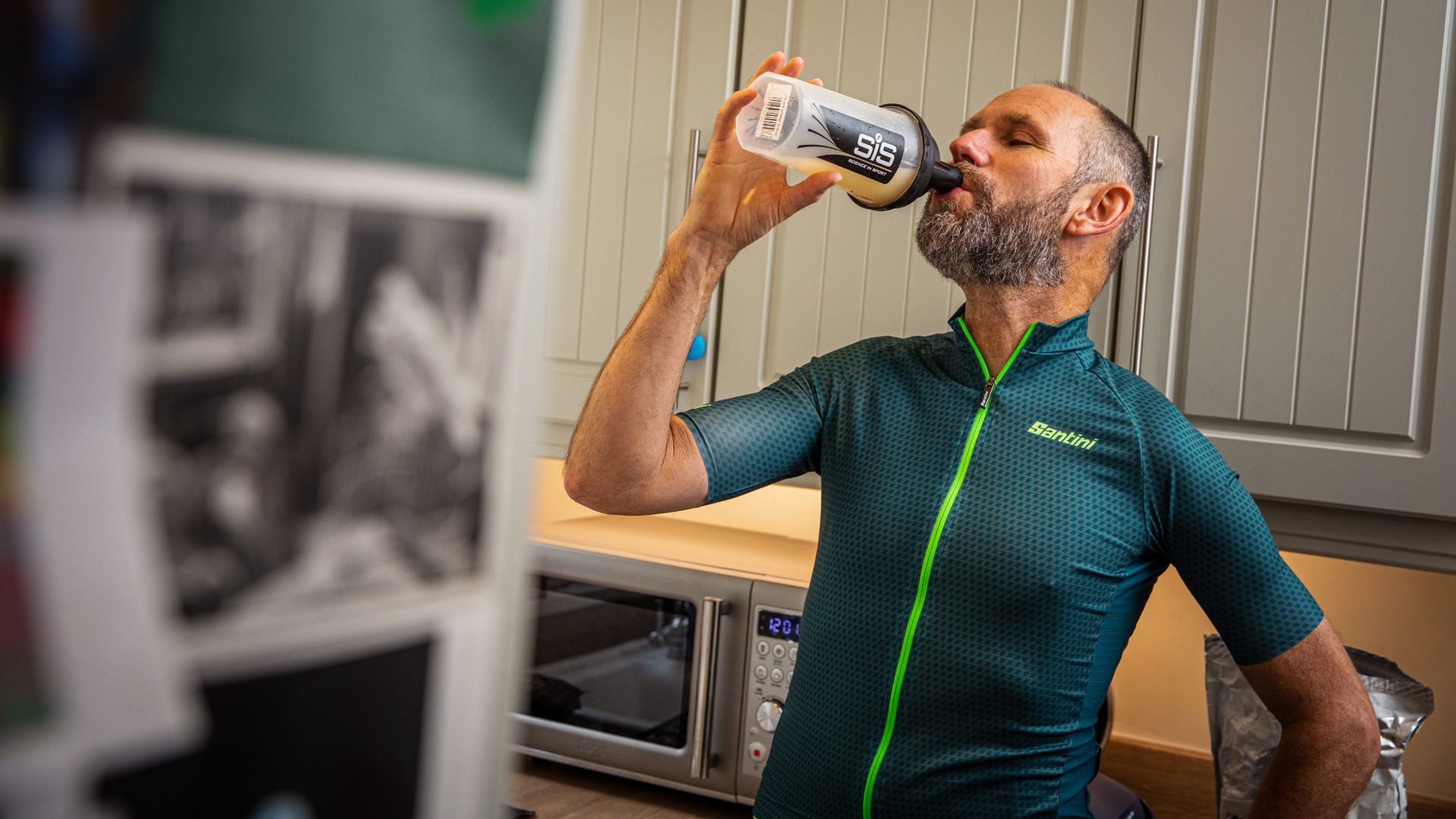
The latest race content, interviews, features, reviews and expert buying guides, direct to your inbox!
You are now subscribed
Your newsletter sign-up was successful
The best recovery drinks for cycling are massively beneficial for any cyclist looking to maximise gains from their training sessions and support the body's overall health. These products ensure you’re getting the right amount of carbohydrates, protein and electrolytes for optimal recovery.
For effective recovery after cycling, carbohydrates are needed to replenish our glycogen stores, allowing us to train again the next day. Meanwhile, protein is necessary to enable the muscles to repair and build up stronger, ready for the next workout. This is also true for electrolytes, which help restore fluid balance, support muscle repair, and, most importantly, prevent cramping.
Your approach to cycling nutrition is one of the essential areas to focus on to ensure you reap the positive adaptations from training. It is worth remembering that recovery is only one part of the story. You should certainly check out our guides to the best energy gels and the best energy bars for fueling during your ride.
Within this guide, we have included products such as recovery powders, ready-made drinks, and vegan options. Below, we rate the best recovery drinks and explain why some are better suited for specific individuals than others. Our award for best overall goes to High5 Recovery, which offers the best value, formula, and palatable mix. Then, we answer your questions about recovery drinks at the bottom.
The Quick List
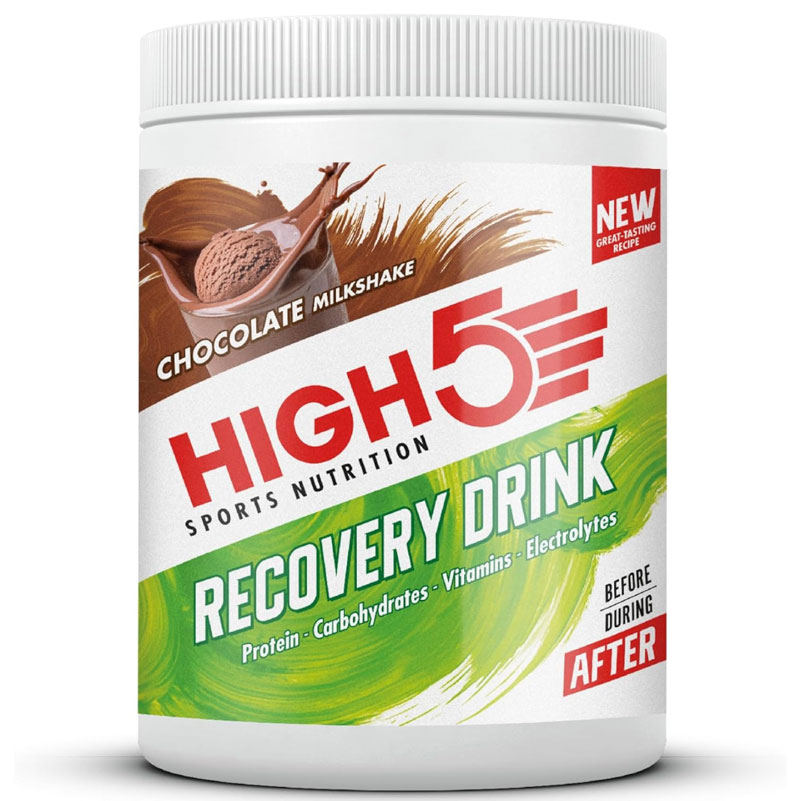
High5 also offers the perfect 3:1 carbohydrate-to-protein ratio that works to rebuild muscles and replenish energy. Slightly thinner when mixed than some, which may make it more palatable after exercise, although some flavours didn't suit our tester.
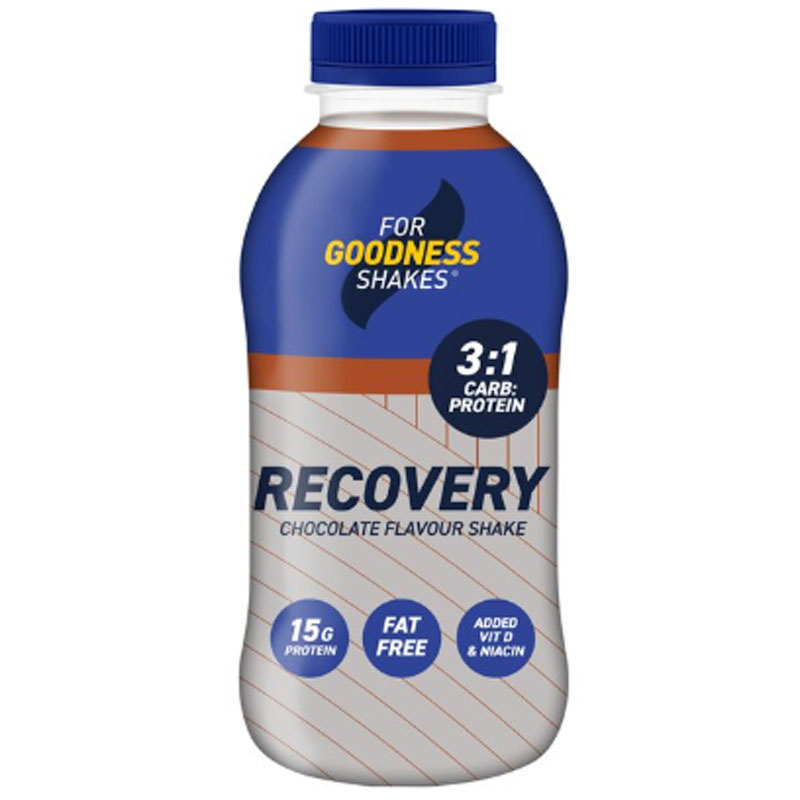
For those seeking a simple, pre-mixed product, I highly recommend this. It received five stars in testing due to its excellent taste, protein and carbohydrate content, practicality, and finally, its value for money
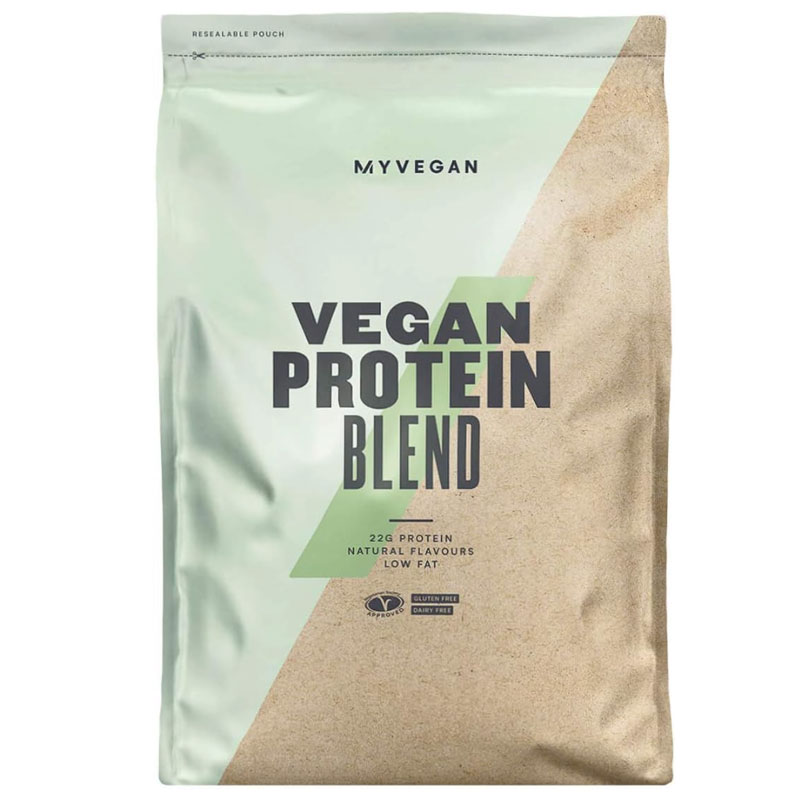
MyProtein's Vegan Protein Blend powder mixed easily with water and made a great-tasting drink with 22g of protein, although carbs might need some supplementing from other sources. The flavours were all excellent, and best of all, it is extremely good value too.
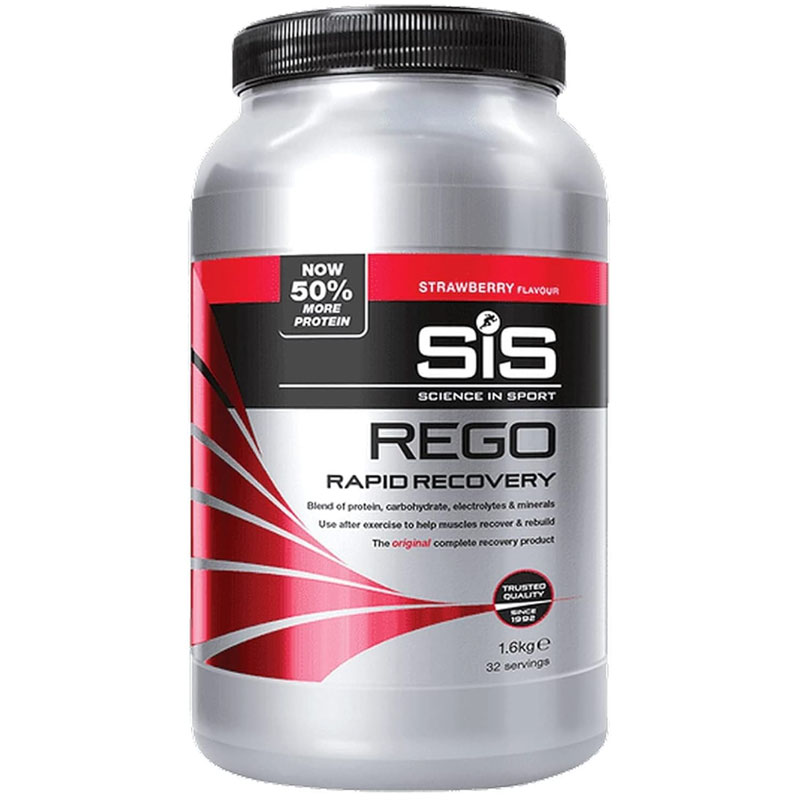
REGO is soya-based, so it is perfect for vegan athletes and includes electrolytes to help with rehydration as well as muscle recovery. The velvety texture is easy to drink, and the available flavours are all very pleasant. It isn't the cheapest drink on test, though.
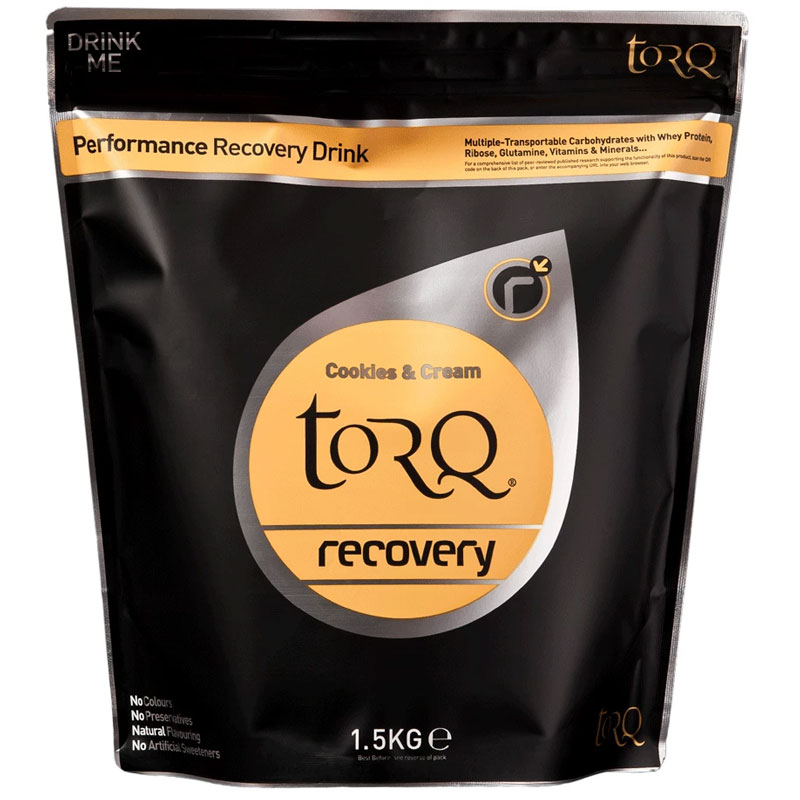
Featuring a huge amount of carbs, the Torq Recovery product acts as the ideal meal replacement option for those that need it. It tastes good and includes a multitude of vitamins and minerals as well.
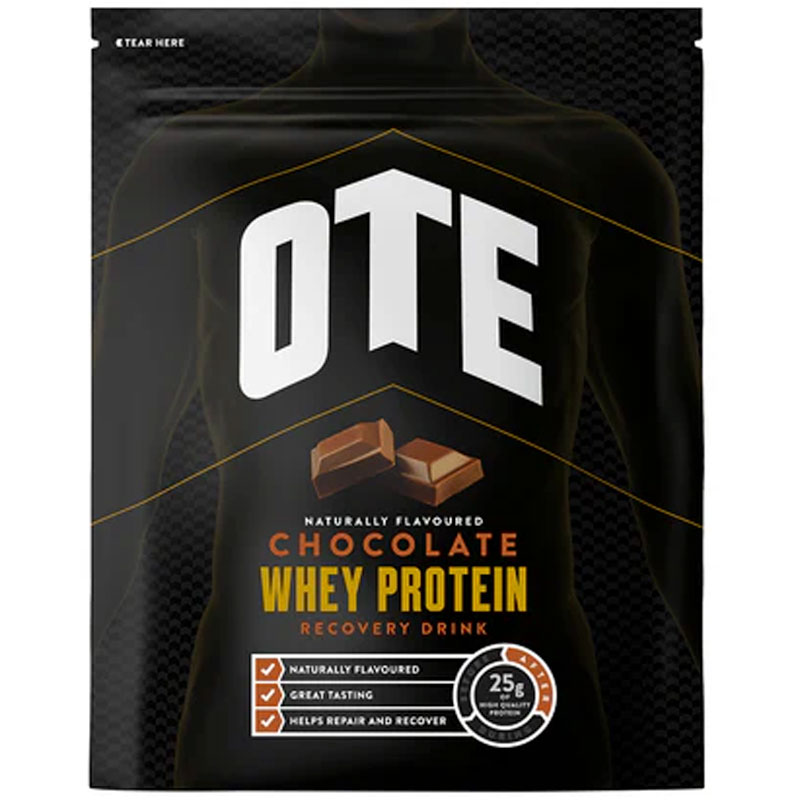
The whey adds extra protein to OTE's recovery drink, but it does lack a little in the carbs' department though. It is Informed Sports Certified, so can be used safely by competitive athletes and it also benefits from added essential and branched-chain amino acids for a boost to muscle recovery.
Load two more best recovery drinks
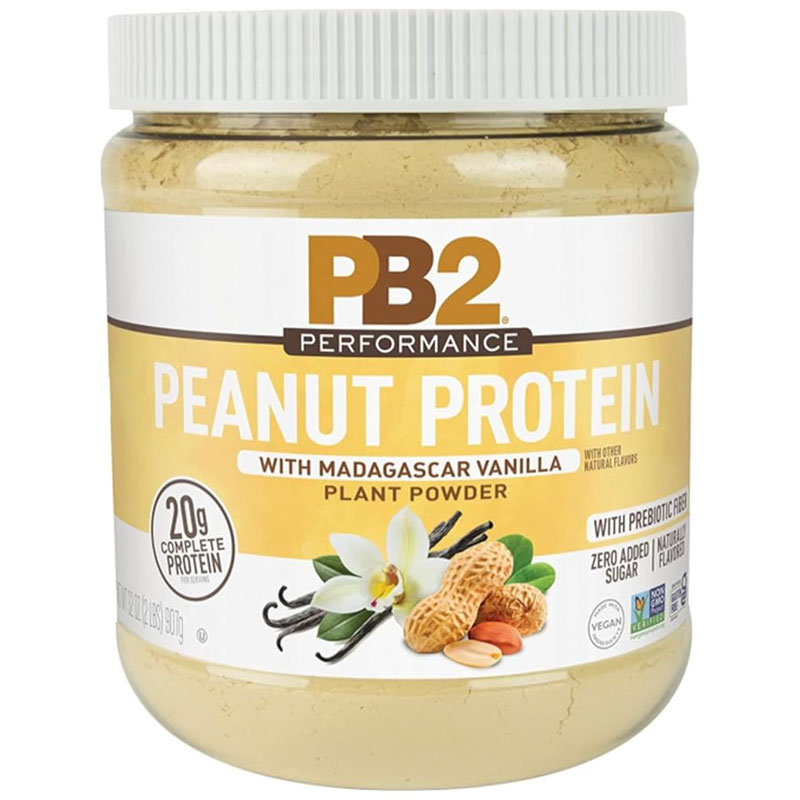
For those sick of sweet gels and drinks, PB2's Peanut Protein drink may well hit the spot. There is a slightly chalky texture but no powdery lumps, whether mixed with water or milk, and the drink is both vegan-friendly and gluten-free. It is a little pricey, though, and the occasional nut fragment may put some off.
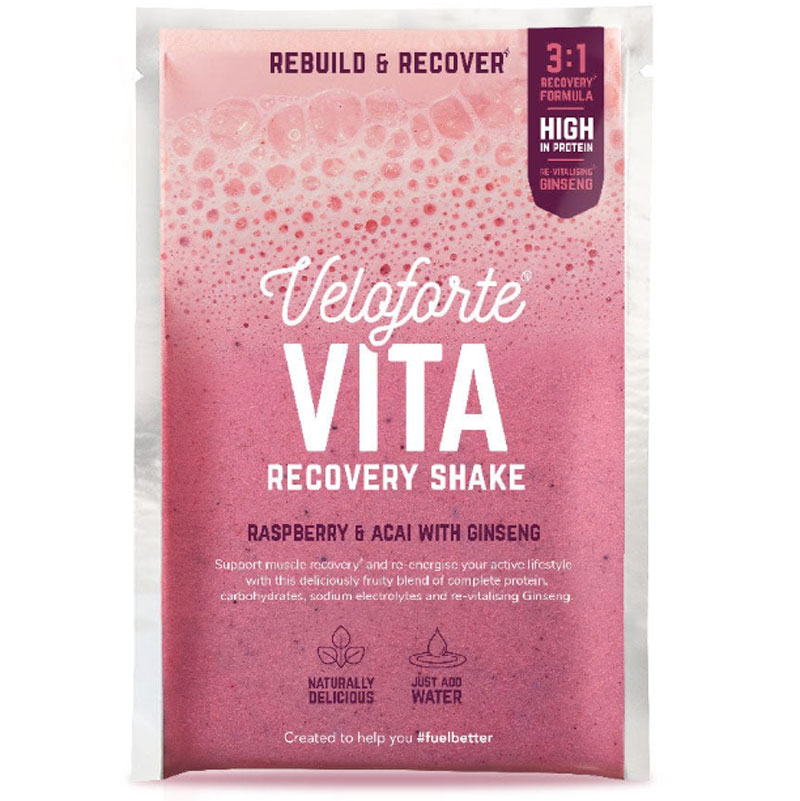
If you are a rider who wants a drink made from purely natural ingredients, then the Veloforte Vita is the product for you. It has a refreshing taste, although the consistency is more like a juice rather than a shake.
Best recovery drinks for cycling: reviewed and rated
Best overall
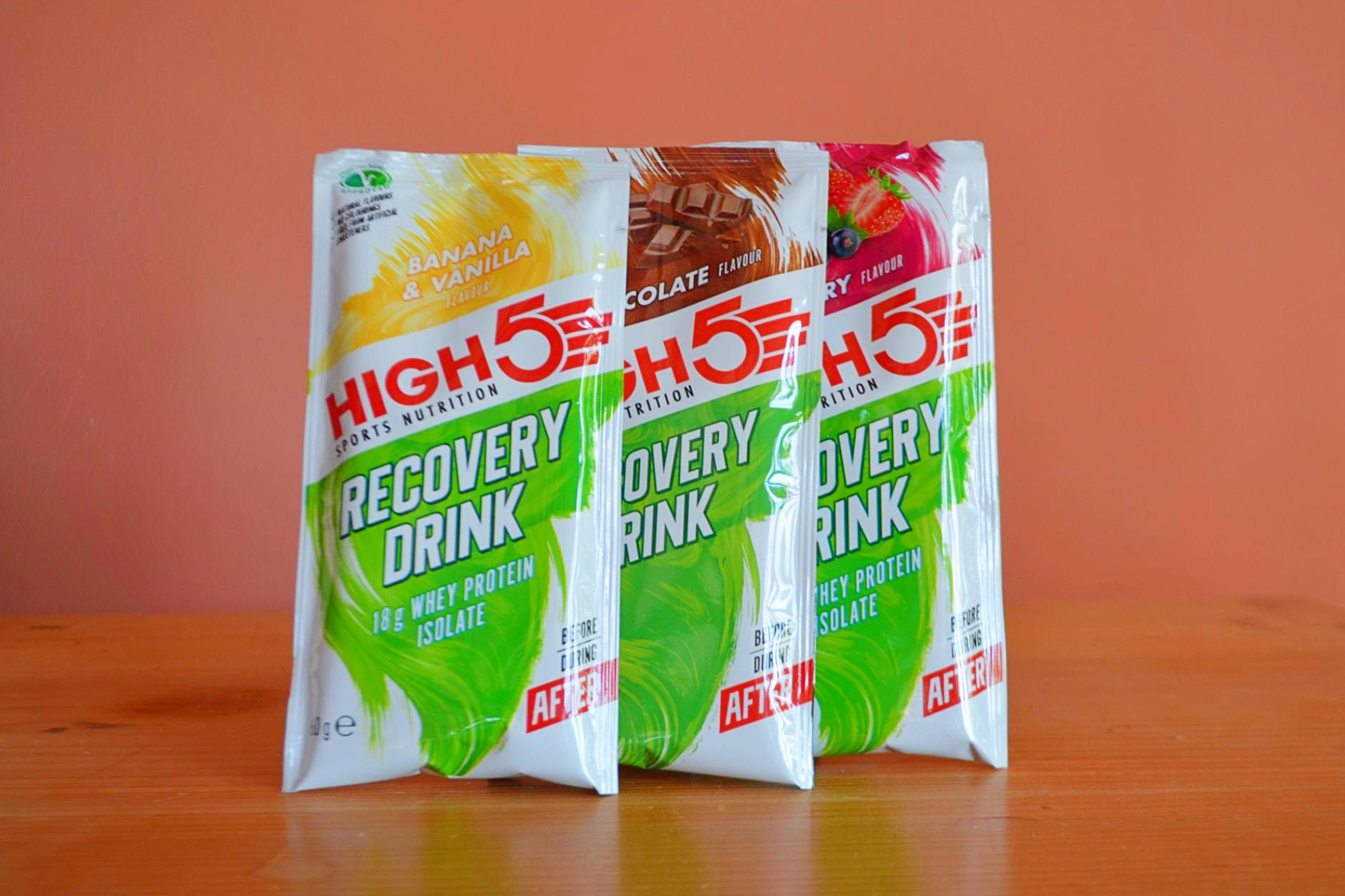
1. High5 Recovery Drink
Our expert review:
Specifications
Reasons to buy
Reasons to avoid
The High5 recovery drink was the only other protein powder on test to offer the same ~3:1 carbs to protein ratio. It’s the right balance for getting sufficient protein in for rebuilding your muscles, without having to take on an excessive amount of carbs.
A bonus point for High5 is the option to get the product batch tested, which helps to put your mind at ease that there isn’t contamination with any banned products that would fail a doping test. Although most of us won’t get tested, it is good to know what you are taking is ‘clean’.
The drink mixed very well and gave a more watery consistency than many of the drinks, possibly preferable for some after a hard session, as it’s easier to drink than a thicker shake. The flip side is that it’s maybe a little less filling – not by much, though. Flavours were good on the whole, but I found the banana one to be a little too weak.
Value was pretty good among competitors, and the only reason we docked half a mark was due to the inconsistency between flavours. Other than that, an ideal recovery drink.
Best pre-mixed drink
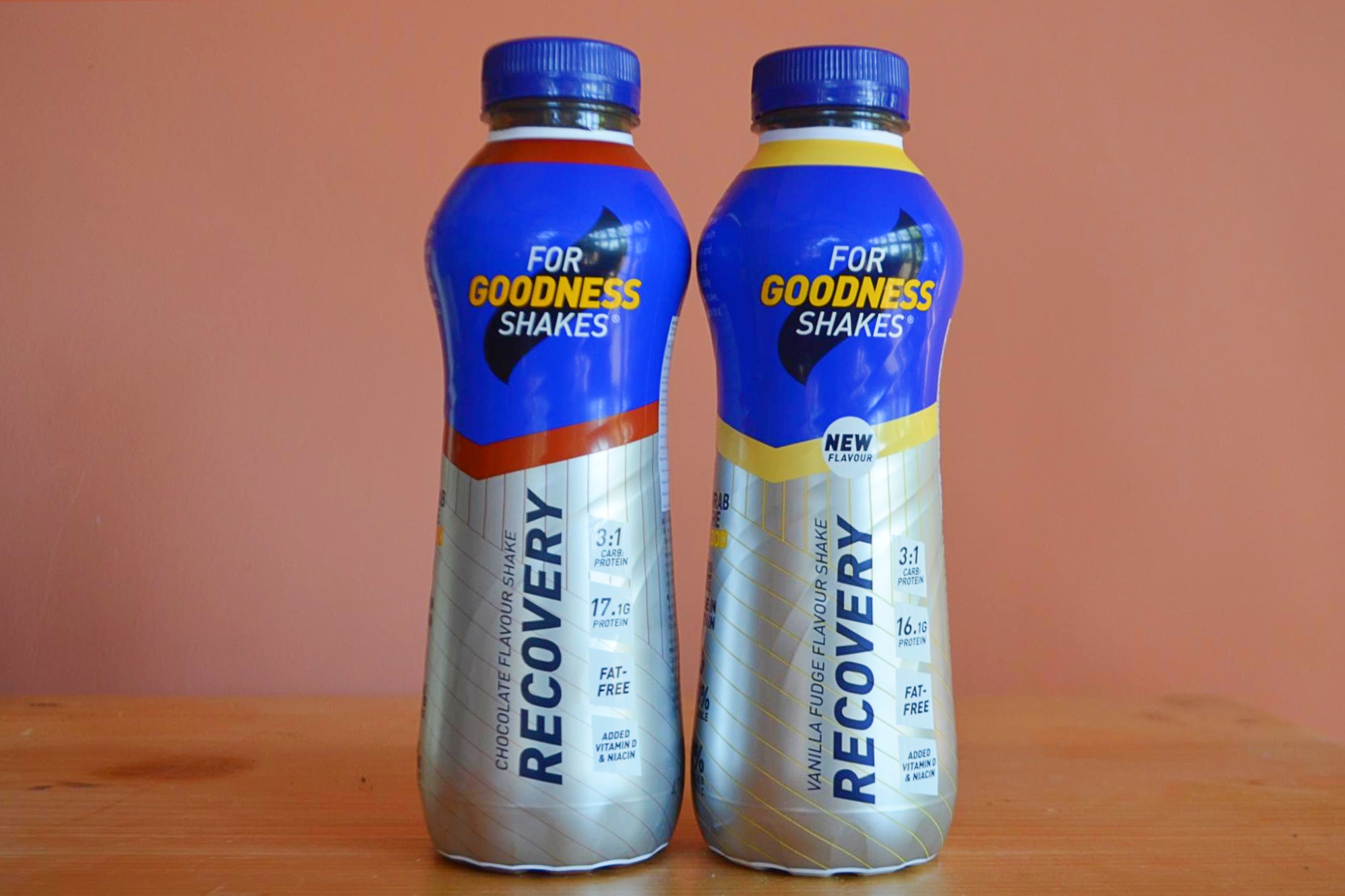
2. For Goodness Shakes Recovery Drink
Our expert review:
Specifications
Reasons to buy
Reasons to avoid
The For Goodness Shakes Recovery drink was as close to perfect as possible. Not only a great ratio of carbs to protein but also a good profile of vitamins and minerals for hydration and recovery. Obviously not lactose-free, but using milk as a base gives a great source of protein and calcium (great for cyclists where bone mineral density is important), but also very good for hydration post-exercise.
The taste and consistency are close to that of a really good milkshake, and left me feeling very satisfied after drinking. The taste may be a little sweet for some, especially the vanilla fudge flavour, but I loved it and my desire to raid the sweets cupboard after a training session was quenched!
The price is good too, with the ready-made shake being one of the more competitively priced options, there isn’t a need to buy in bulk! Being pre-mixed, it’s also easier to bring along with you for consumption after a race or a gym session. 5/5 was well deserved!
Best vegan formula
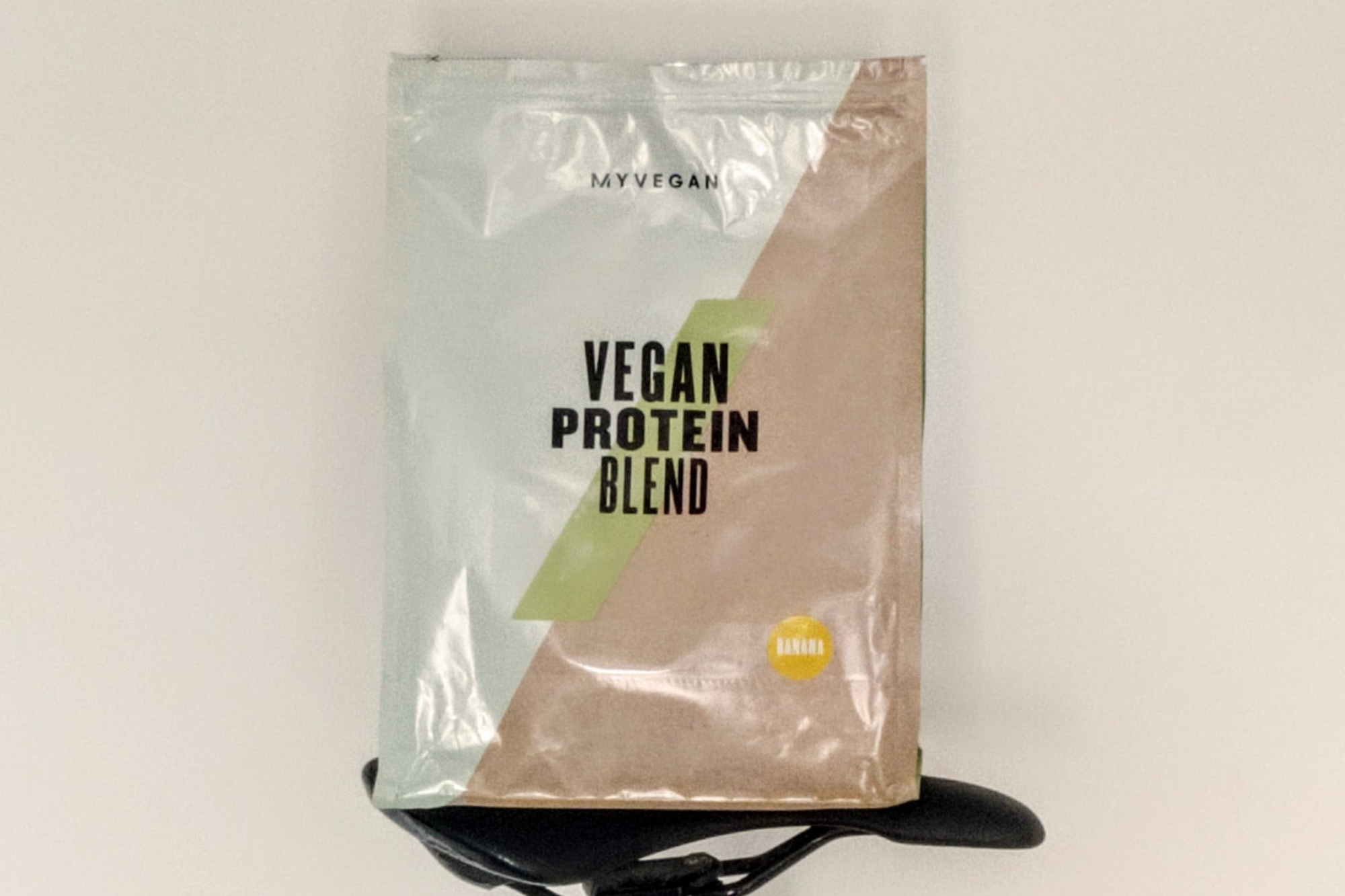
3. MyProtein Vegan Protein Blend
Our expert review:
Specifications
Reasons to buy
Reasons to avoid
The great taste and value of MyProtein's Vegan Protein Blend is very hard to match. The single-scoop, 30g serving size mixes very easily with minimal shaking, and we found there are never any lumps or grittiness in the resulting shake. It has a neutral colour and MyProtein assures us that no artificial colours and flavours are used in this product.
Each serving provides a whopping 22g of protein, coming from a combination of pea and fava bean isolate, meaning the full amino acid profile is covered. With only 3.9g of carbs per serving, you'll need to ensure that your glycogen stores are topped up post-workout by some alternative source of carbohydrate, such as an oat bar or a larger helping of pasta with a meal.
There’s a wide range of flavours to keep the taste buds tantalised, including strawberry cheesecake, turmeric latte and ruby chocolate. My favorite is the (admittedly rather traditional) banana, though I can also vouch for the white chocolate raspberry and caramel biscuit – which is astonishingly caramel-biscuity!
Perhaps the best thing about this product – given the financial crunch we’re living through – is its excellent value.
Best Informed Sport tested drink
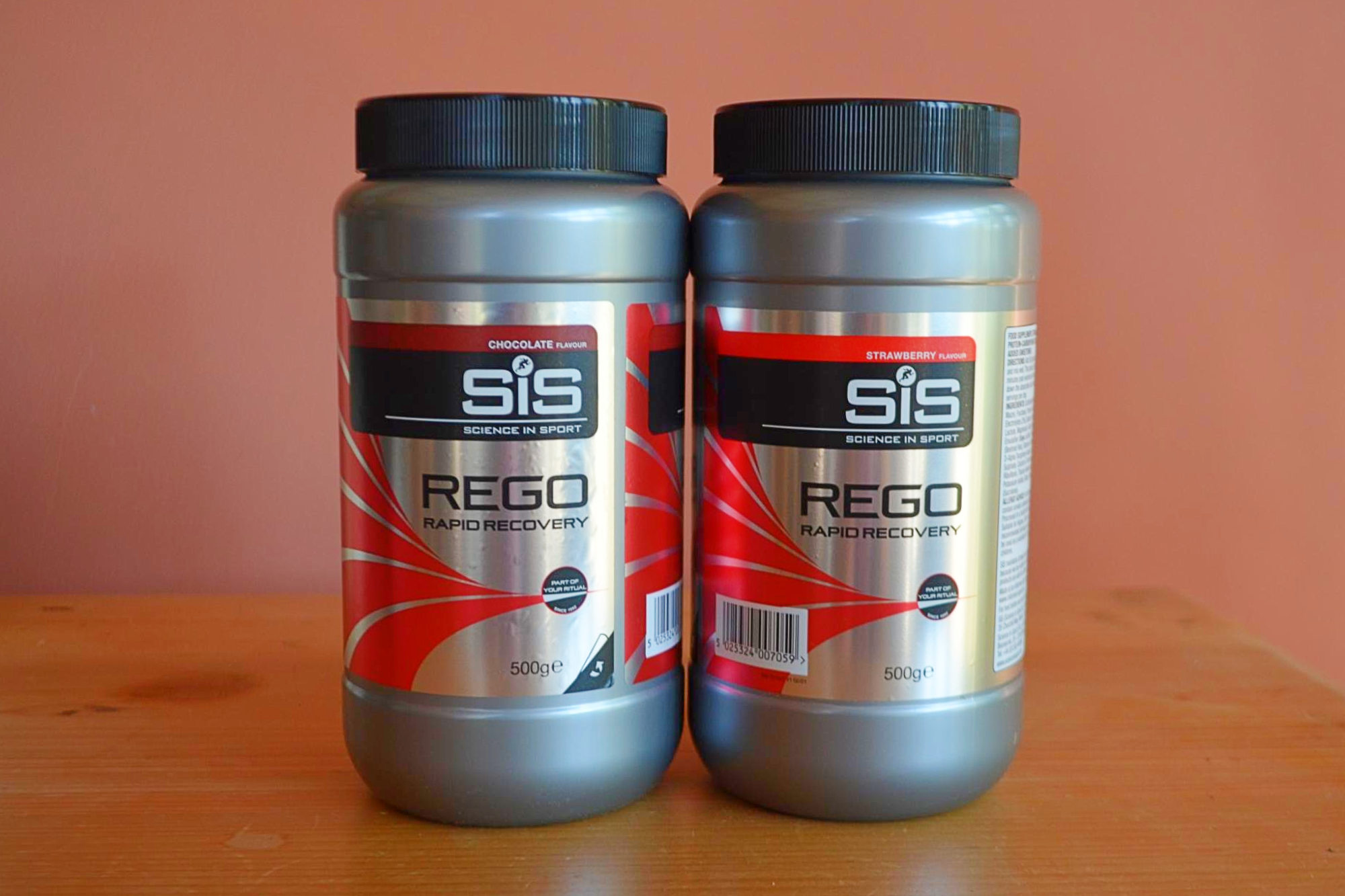
4. SiS Rego Rapid Recovery
Our expert review:
Specifications
Reasons to buy
Reasons to avoid
SiS REGO Rapid Recovery has been around for a long time, and does well with a high amount of protein and solid amount of carbs. It is a 1:1 ratio, though, so the carb content is perhaps a little lacking – but it can be consumed alongside a meal more rich in carbs.
The drink mixes very well with no lumps and has a nice flavour without any artificial taste. A nice addition is a full profile of electrolytes, which makes this a great drink for rehydration – an aspect sometimes forgotten by other recovery drinks and a big bonus.
The drink left me feeling satisfied after a workout, but still a bit hungry after around 30 minutes or so. When bought as a 1.6kg tub, the value is exceptional. Additionally, all SiS products are batch-tested, which is a great feature.
The lack of carbohydrates is the only point we could mark down, but the addition of salts and other vitamins and minerals for better hydration was a big enough bonus so we only docked half a mark – especially as it’s quite easy to get your carbs from another source.
Best meal replacement
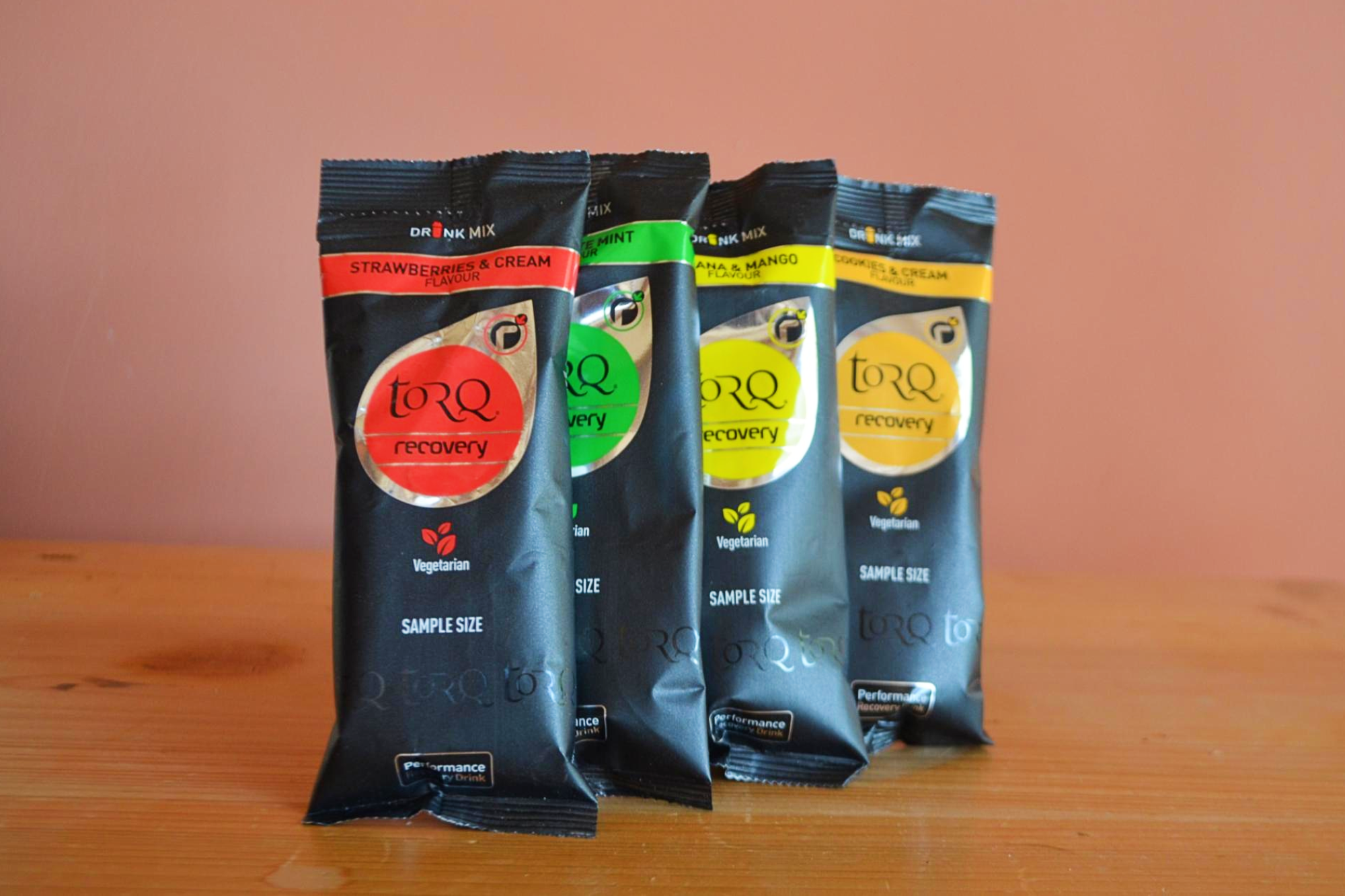
5. Torq Recovery
Our expert review:
Specifications
Reasons to buy
Reasons to avoid
Torq’s recovery drink is very different to most on this list, in that it contains a huge amount of carbs. The price per serving is high, but the recovery drink you get is near enough a meal replacement which – for people having just finished a race or short on time – might actually be ideal.
The drink also features branched chain and essential amino acids, as well as a very long list of vitamins and minerals that are essential to recovery and hydration.
When mixed, the drink is quite thick but has no lumps and tastes delicious – it was one of my favourites in that regard. Due to the high carb and protein content, it left me very full afterwards and not in need of any additional fuelling.
Torq recommends a different serving size dependent on the duration and intensity of exercise, from one 50g sachet for a moderate workout up to two for a hard session (or none for a light workout).
The smaller sachets don’t really offer either enough protein or carbs for recovery from a hard session. The ratio is good, but the total content is low. To get enough protein, you do need the full two-sachet dose – but that will constitute a meal replacement for most people, with around 340kCal of energy content.
Consumed like this, the value isn’t bad. But given the $3.40/£3.40 per serving we couldn’t give it higher than a 4, despite its great hydration benefits that are only present to this extent in a few recovery drinks.
Best with whey and casein protein
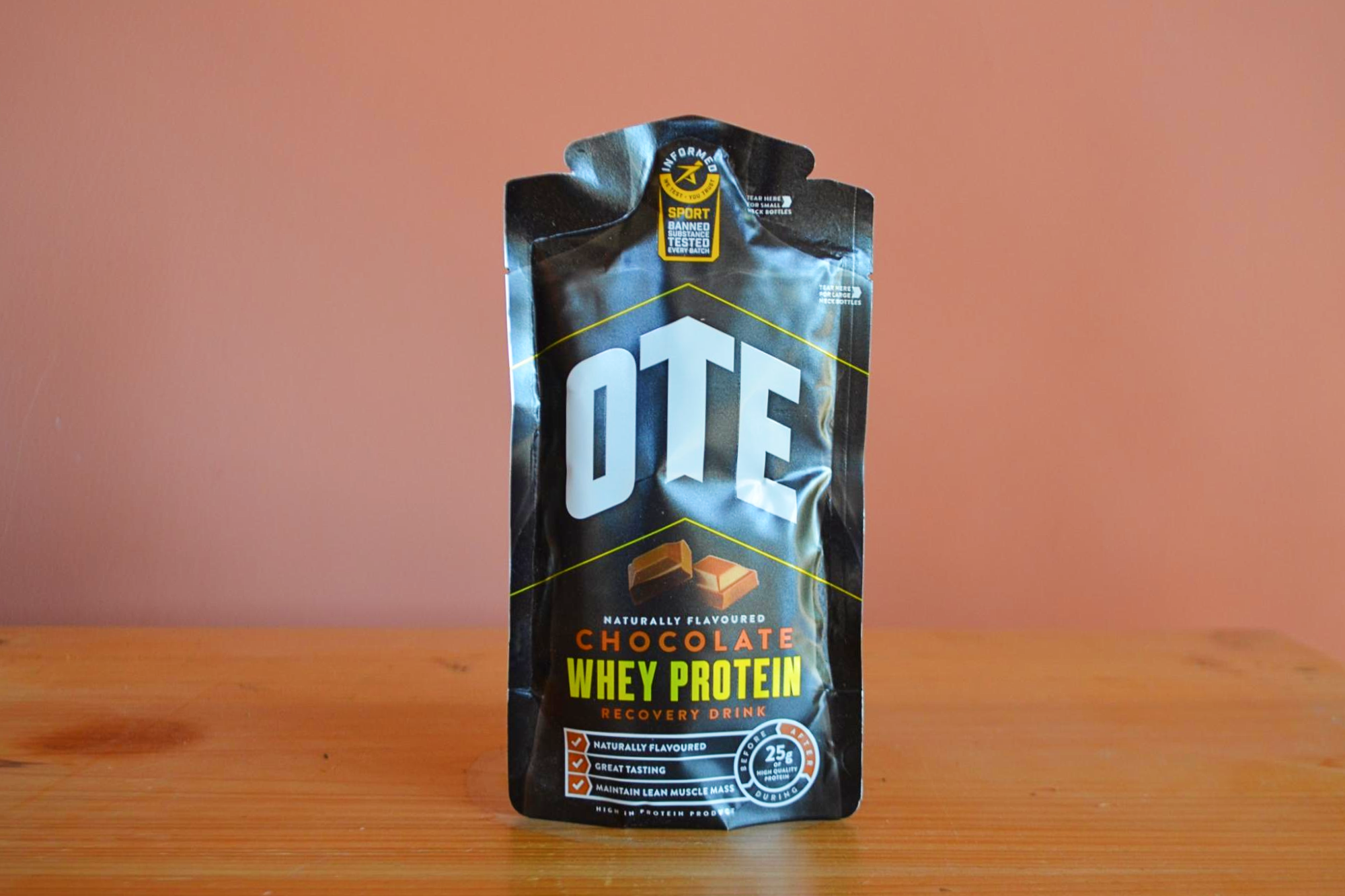
6. OTE Sports Whey Protein
Our expert review:
Specifications
Reasons to buy
Reasons to avoid
OTE Sports’ Whey Protein recovery drink offers a little more protein than most of the others on test, landing it slap-bang in the middle of the recommended 20-30 grams. The carb content, on the other hand, was a bit lacking for a recovery drink, though.
That said, the inclusion of essential and branched chain amino acids was a bonus for muscle recovery. And the option for batch testing, along with everything being made in a facility that is Informed Sport Certified is another perk.
The drink mixed very well and left us feeling full, ready for a proper meal later on. However, there was a strange artificially sweet taste – although there are apparently no artificial sweeteners present.
The drink is quite expensive compared to some of the more value-oriented options, but it still sits around the middle of the spectrum when bought in bulk. The option for sachets is useful for those travelling or bikepacking, but it is more expensive.
One point is lost due to the reduced carb amount and funny flavour, but when bought in bulk this offers a great protein drink at a solid value.
Best savoury drink
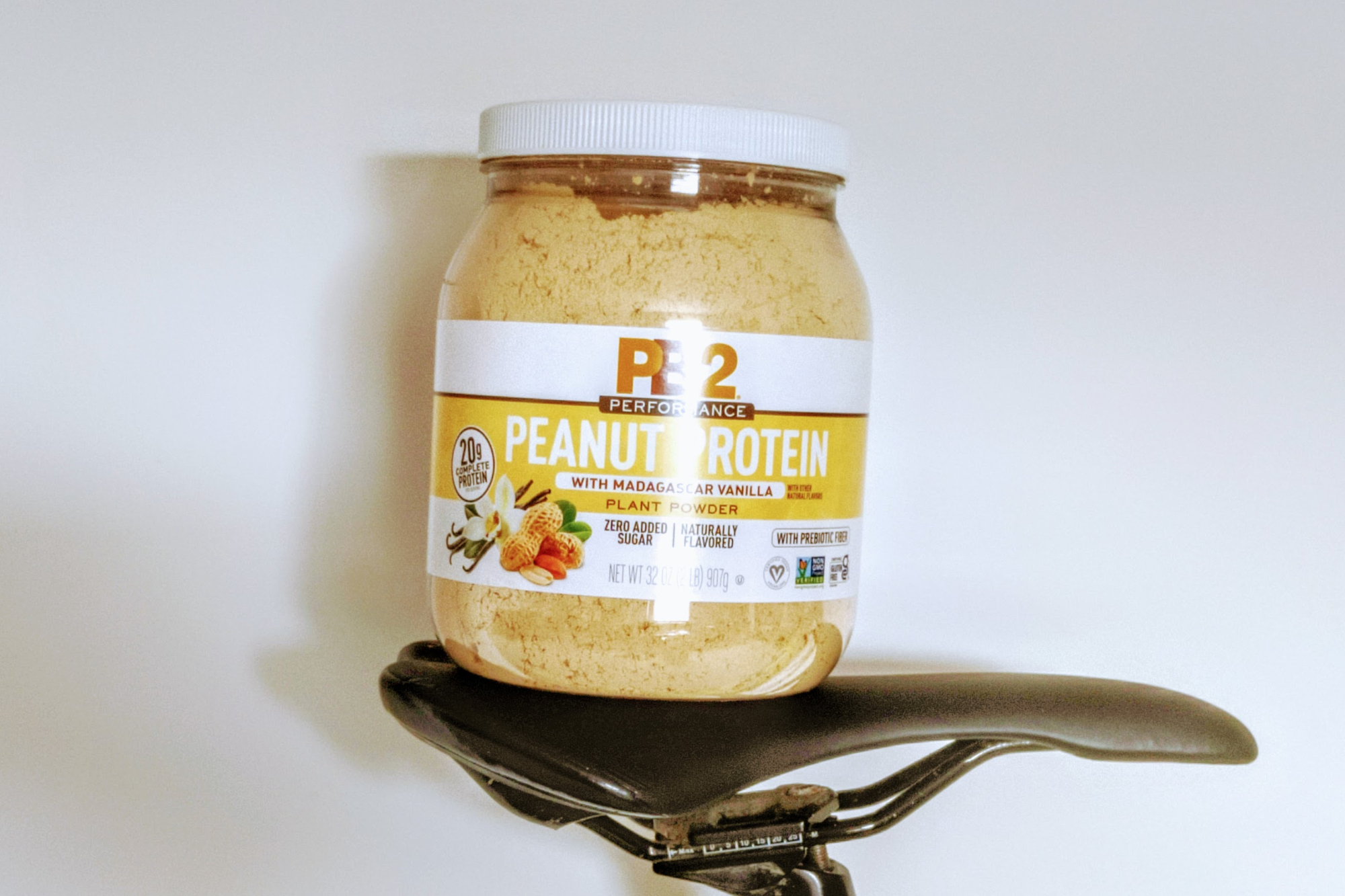
7. PB2 Peanut Protein
Our expert review:
Specifications
Reasons to buy
Reasons to avoid
As a peanut butter addict, I was excited to try US brand PB’s powdered peanut protein. Could it really provide that uniquely satisfying peanut butter hit of flavour? The answer is: very nearly. The two-scoop, 45g serving, mixed with 250-350ml of water or milk, provides 20g of protein and 190 calories.
The powder’s main ingredients are roasted peanuts and brown rice – and you couldn’t ask for a more full-bodied peanuty flavour. It contains no added sugar. We found that it’s ‘dry’ rather than sweet, to use wine terminology, which is exactly how I like my peanut butter. The texture is slightly chalky, with the occasional hard fragment of nut – caution advised – but it mixes easily leaving no powdery lumps.
There are Dutch Cocoa and Madagascar Vanilla versions, as well as almond-based alternatives for those less keen on peanuts, and the whole range is vegan and gluten-free.
Most natural ingredients
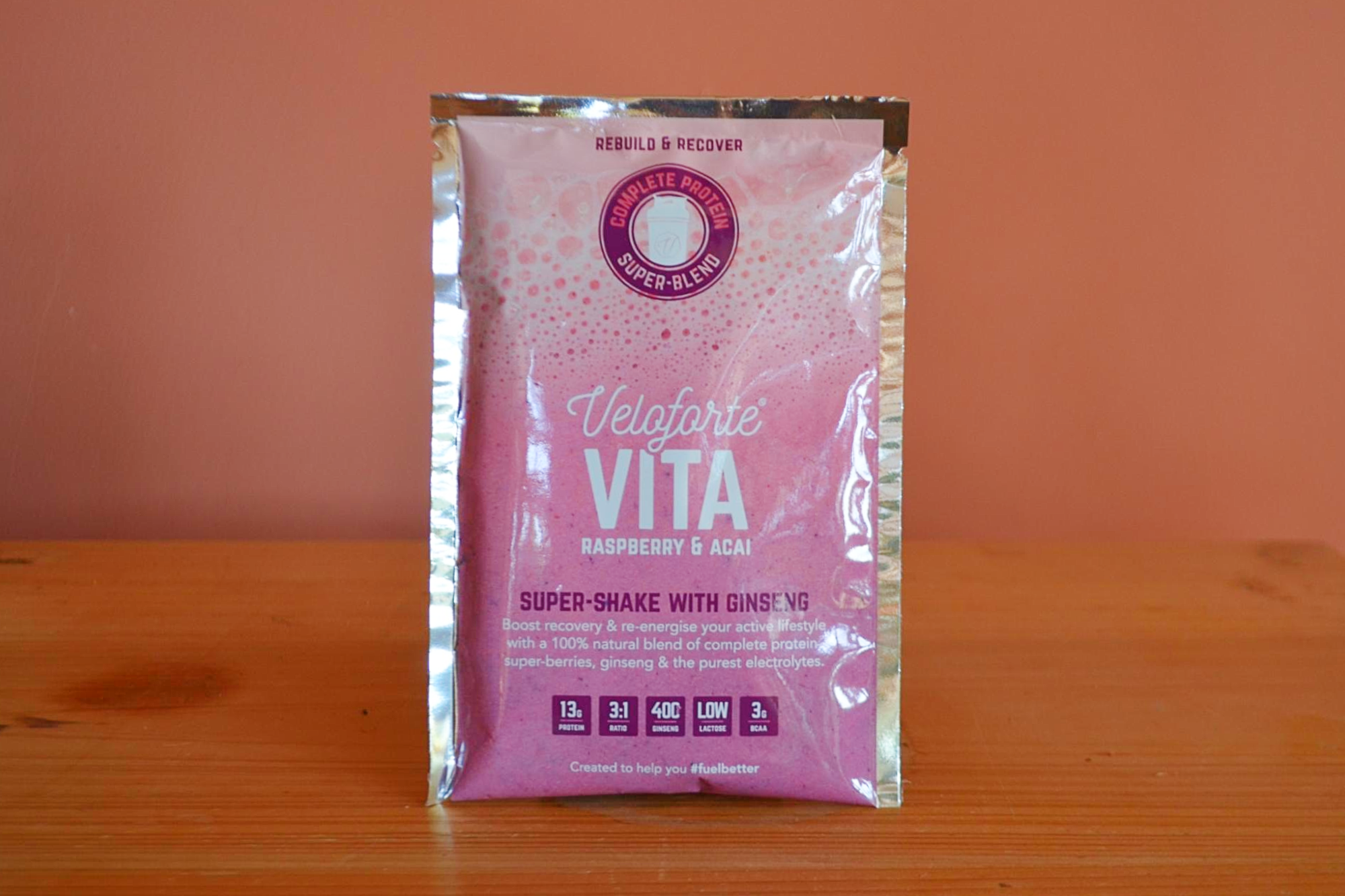
8. Veloforte Vita
Our expert review:
Specifications
Reasons to buy
Reasons to avoid
The Veloforte Vita recovery drink is ideal for those who want completely natural ingredients, without excessive processing or artificial flavours. This does lead to a slight grittiness in the drink when mixed, so it tastes more like a smoothie or fruit juice than a milkshake. The flavour was refreshing and natural and I did quite like it.
It is a little weak, though, and didn’t leave me very full. The amount of carbs and the ratio of that to the to protein is quite good, but the overall protein quantity is still too low. You can mix it with milk, though, which will boost the carbs and protein as well as leading to a thicker consistency.
The price per serving is high, likely due to the quality of the ingredients. Another nice touch is that Veloforte has a recycling service for all their waste and wrappers, as well as not using any plastic in their delivery. This is really the only option for those who are environmentally conscious. But considering the lower protein content and the high price, it missed out on the top scores.
Verdict
All the drinks contained a level of carbohydrates and protein that would be beneficial to recovery. Many of the additional selling points were the type of carbohydrates, the type of protein, added vitamins or minerals, or the quality of the ingredients. Some avoided sugar, but for a post-exercise recovery drink, fast-acting sugars are ideal.
Protein-wise, whey protein has been found to be faster acting than casein, and animal proteins are often more complete (all the essential amino acids) than many vegan proteins, as well as being more bioavailable. This is why we’ve grouped the vegan ones separately.
All the drinks would be beneficial to add to a recovery routine for those who train intensely during the week, or are perhaps time-limited, so post-session meal prep is more difficult. I always advise that people should try to get their macro and micronutrients from their diets, but I also found that having these shakes was very effective with a hectic work/life/training schedule during the testing period.
My personal favourite for value and taste was the Wiggle recovery drink. It surprised me as I thought the lower cost would mean it might not mix as well or might taste artificial. The SiS rego offers the best option for those racing who need to ensure sport supplements are batch tested and not contaminated – OTE also offers this but at a higher price and I wasn’t as keen on the taste, personally.
For Goodness Shakes Recovery Shake was top for taste, satiety, ease of use and also at a competitive price point. The bottles are fully recyclable, which is a nice touch, and I found them great straight after a gym session - they would also be ideal for after a race with a longer drive home.
In terms of sustainability, it’s worth mentioning that Veloforte. As well as using organic ingredients, the brand offers a recycling service for all their product wrappers and packaging. The price is high for the products, but for those who care about their environmental impact, it’s a real bonus.
Meet the tester

Andy is a busy man, being not only a Sport & Exercise Scientist, but also runs his own business as a fully qualified and experienced Cycling Coach and Consultant. If that wasn't enough, he also works as a Wind Tunnel operator and Performance Consultant at the Silverstone Sports Engineering Hub. Then, with what spare time he has, he decides to write for us as one of our expert testers. Given how 'on-the-go' Andy is, it is essential that he takes care of his body, espcially since a significant portion of his day revolves around cycling and training, which makes recovery espically vital to him. He also needs to practice what he preaches. A large part of any coaching and consulting business is your own knowledge and experience.
How we test
Given that actually testing recovery effects is a far more complex process than just having different recovery drinks – sleep, stress factors and temperature to name but a few, as well as the need for a large cohort of willing volunteers – I tested these drinks on three main metrics in terms of subjective measures: Taste, how well they mixed and the resulting texture, and how much they contributed to satisfying hunger/need for something after a workout.
I tried all the drinks within a period of 5-40 minutes after completion of a training session, be that on the bike or in the gym. All the drinks (that required it) were mixed and shaken vigorously for about 30 seconds at the time of drinking and consumed at room temperature.
Taste is, of course, a very subjective measure, so I tried to include what was noticeable about the taste in neither a positive nor a negative way. Some people may prefer a sweeter drink even if it is a little artificial tasting, some may prefer a more natural taste. Even texture, thin or thick, is very subjective. However, points were deducted for clumps.
Satiety after exercise again was difficult to measure exactly, but does give an indication of whether the drink consumed adequate levels of carbs and protein for use straight after exercise. Some were more successful than others, and some would work well to complement meals rather than be outright meal replacements.
Price is an easy one to measure and it’s more about your preferences and what you’re willing to pay for. Many of the drinks contain additional minerals and vitamins, but my honest opinion on that is that if you consume a healthy and varied diet throughout the day, you should not require additional supplementation. Studies have shown that the only supplements which fill a void that many diets/lifestyles lack are Omega 3 supplements and Vitamin D for the winter months in northern hemisphere countries.
FAQs
Do post-workout recovery drinks work?
They do yes, although are sometimes surplus to requirements.
When we exercise – especially at high intensity or after 90 minutes – unless we take on additional carbohydrate fuelling during the ride, we will deplete our muscle glycogen stores. Replenishing these stores ensures that we are able to complete strenuous training the next day, without our performance being impaired.
Many studies have shown that consuming carbs within an hour of competing exercise is most beneficial as the insulin response post-exercise directs the carbs (broken down into glucose) to the muscles rather than being directed into fat stores. Of course, there’s more to recovery than one meal, but kickstarting the recovery with fast-acting carbohydrates does aid recovery. And when time or access to cooking is limited, recovery drinks offer a great option for fast-tracking our recovery for the rest of the day and the following days.
Getting enough protein is also a vital part of this, and consuming carbs with protein assists even further with muscle protein synthesis. When we exercise, we damage the muscles in different ways. This is the reason we experience delayed onset muscle soreness (DOMS). To help combat this, adequate protein consumption ensures that there are adequate amino acids present for muscle protein synthesis allowing damage to be repaired.
This means less pain in our legs, and greater muscle development post-training, especially for those wanting to build greater muscle mass. Ideally, we want between 20-30 grams of protein, as more than that has been found to be surplus to requirements.
Another benefit of adequate protein is reducing muscle catabolism, as cycling is a weight-limited sport (however, always focus first on the ‘Watts’ part of 'watts per kilogram'), when trying to burn fat in a safe manner, it is important to maintain high dietary protein so as to reduce muscle loss during a calorie deficit.
Another benefit of recovery drinks is hydration. Proper rehydration is equally as important as replenishing carbs and protein consumption. A benefit of consuming fluids with carbs is that it prevents the water from passing through as quickly, improving hydration efficiency. Studies have shown that milk is better for hydration than plain water, for instance, and part of this is due to the presence of carbs.
So yes, recovery drinks do work.
What should I drink after a bike ride?
After a ride you should ideally consume fluids with adequate salts, and with the fluid amount recommended being 1.5x the amount that you lost during exercise. However, this isn’t always easy to measure, so drinking to feel is the easiest and still very effective practice.
Carbs-wise, you should be consuming in total (from drink and additional food) between 60-100 grams of carbohydrate, depending on the duration of the training, the intensity, and the training you have in the following days.
Protein should be 20-30 grams as more than this has been shown to not result in any additional protein synthesis or muscle repair. 20-30 grams every 3-4 hours is best for optimal recovery.
How can I recover faster from cycling?
Recovery from a ride starts before the session begins. Ensuring that you have fuelled enough for the training session in your meals preceding the session will assist in recovery after it.
Say you are doing an hour of intervals, consuming 60-80 grams of carbs ~3 hours beforehand will ensure that you have adequate carb availability to complete the session without the dreaded ‘bonk’. Also, drink enough fluids before and during the session, as well as keeping cool if you’re training indoors.
If the session is very hard, then a cool-down (a period of 10-20 minutes of very low-intensity riding) has been found to be beneficial for clearing the built-up fatigue metabolites that come from intense or prolonged exercise. This can also be done with both active and passive stretching after a session.
Consuming your recovery drink within an hour of completing the training session has also been shown to improve recovery. Studies have shown that even those who consumed the same amount of carbs and protein throughout the day did not recover as well if they left the start of their recovery nutrition till after 1 hour after the end of exercise. Also, ensuring you remain well hydrated in the hours preceding the session is important.
Finally, rest! This is the most important part of recovery, be it sleep or just giving your body the chance to recover. Not all of us have the luxury of the pros to rest all day after a tough session, but short bouts of focused rest will still help. Power naps if you’re able to do them can be beneficial, as well as yoga or mindfulness training. But the best by far is a good night’s sleep. It beats any massage gun, massage session or other recovery tools, and when combined with proper nutrition and hydration is an unbeatable combo.
What’s the difference between vegan and non-vegan proteins?
In the past, some vegan protein powders have not used 'full' proteins - meaning that they do not contain all the essential amino acids which are used as building blocks for much of the tissues in our body, including muscles. But these days, most vegan products use either soy or a mix of plant proteins to ensure a full amino acid profile - as you get with eggs, milk, meat etc.
A separate difference is that vegan protein has been found to be less ‘bio-available’, which means that say we consume 20g of soy protein, only 12g will end up being available for the body to use. 20g of whey protein, on the other hand, will provide 18g of protein that can be digested, processed and available to be used for protein synthesis.
Another difference is that some vegan proteins are more environmentally friendly per gram of protein than animal ones. For example, cows require more land and produce more greenhouse gases than soya beans. However, soya beans flown from abroad can have a higher carbon footprint than beef or milk from your home country.
Some studies have shown that vegan protein sources are more beneficial for health and also your gut microbiome. But these are often found to be more complex issues than just the type of protein. A diet rich in vegetables and fibre will be beneficial for gut health because of the presence of those, not necessarily the source of the protein.
So that one is a little up in the air, but for most people without allergies or specific medical dietary requirements, a diet of mixed lean animal proteins, different carb sources, plenty of fruit and veg, and good levels of dietary protein, will be optimal for gut health.
There are plenty of successful world tour cyclists who follow vegan diets, and many equally successful riders who follow non-vegan diets. Choose what works for you, what matches your ethics and environmental/sustainability views, and what you want to do. Both can work very effectively.
The latest race content, interviews, features, reviews and expert buying guides, direct to your inbox!
Andy is a Sport & Exercise Scientist, fully qualified and experienced Cycling Coach, Sports Director, Freelance Writer, and Performance Consultant. He spent 3 years riding for a UCI cycling team and 7 years as a BC Elite rider, competing in prestigious events such as the Tour of Britain and the Volta a Portugal.
Graduating with a first-class honours degree in Sport & Exercise Sciences, he continues to pursue his interest in research in the field of Sport Science alongside managing his coaching business, ATP Performance. He also works as a Wind Tunnel operator and Performance Consultant at the Silverstone Sports Engineering Hub, working with individuals, teams, and businesses to optimise performance and develop products.